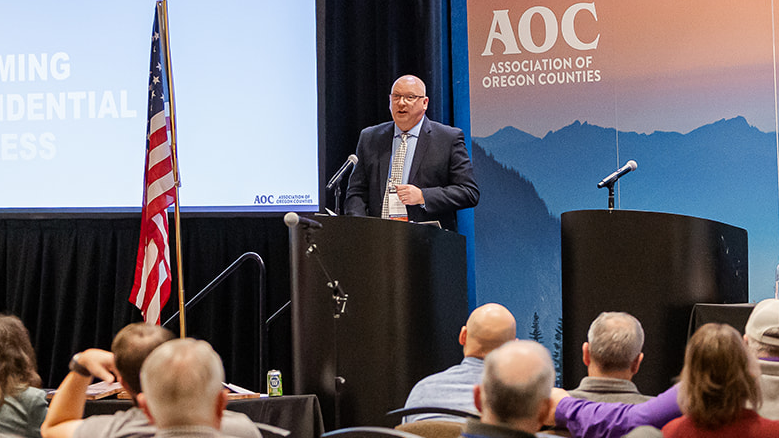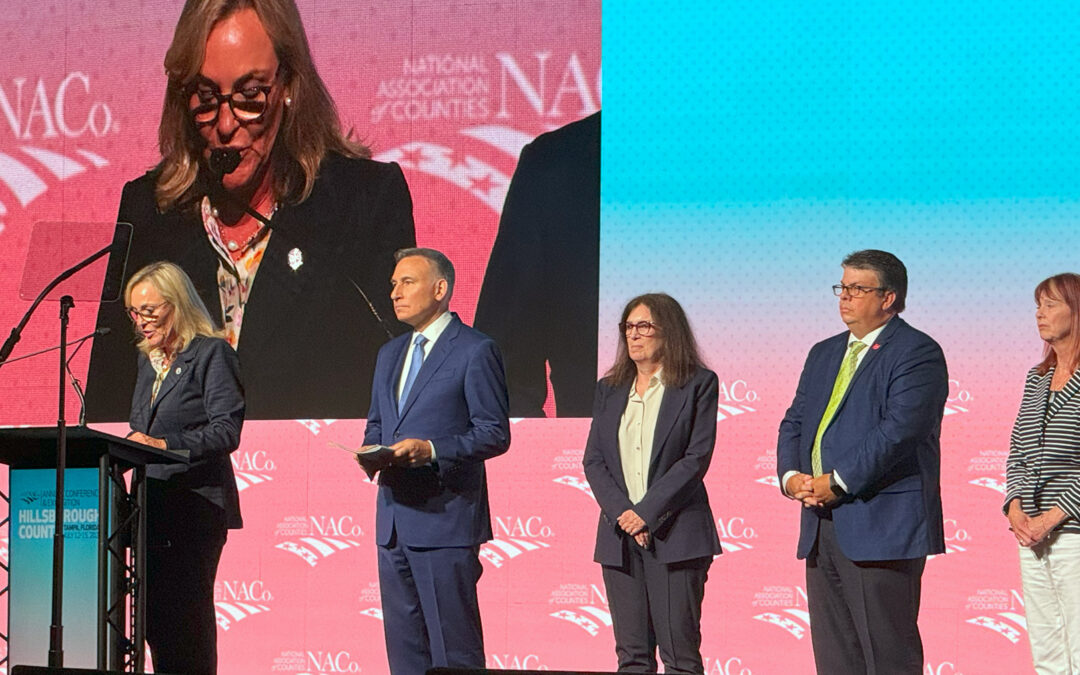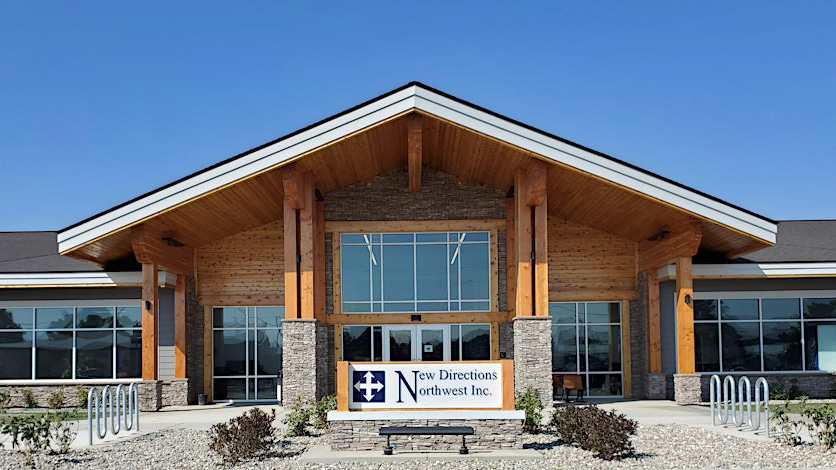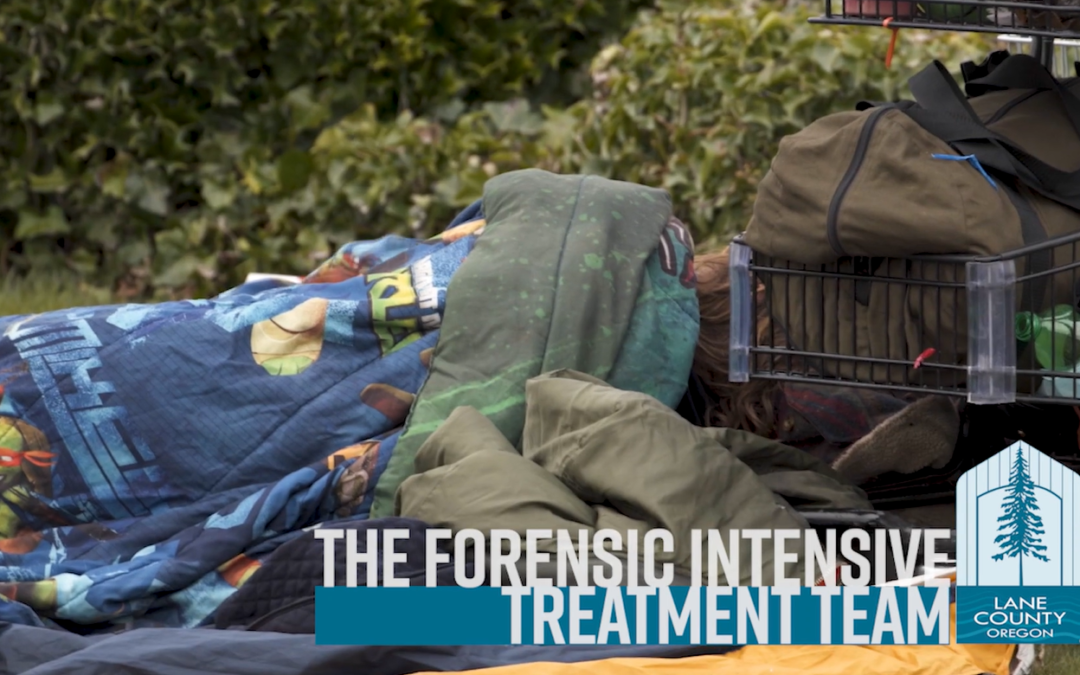
Apr 30, 2025 | AOC News, Health & Human Services
Which communities do you belong to? Who is your closest friend? What are your dreams? Who do you consider family?
These were the questions asked of members of the 2025 County College class during an exercise led by a peer support specialist at the Oregon State Hospital Museum of Mental Health. Participants began with a paper star symbolizing their support systems. As points are removed, the pieces represent how losing support can impact a life. The activity helped the group reflect on the lives of individuals receiving care at the hospital and better understand the importance of community and support systems in mental health treatment.
In addition to this exercise, the class toured the Oregon State Hospital Museum of Mental Health, which explores the history of the hospital since its founding in 1862. The museum shares stories of the patients who lived there and traces the evolution of mental health care over time.
This experience was part of the third session of County College, a program by the Association of Oregon Counties (AOC) designed to equip new county leaders with training on governance, roles, and responsibilities. The session focused on Health and Human Services — a broad and vital area where counties act as the primary link between state programs and local service delivery. As local mental health and public health authorities, counties are responsible for ensuring that public health, behavioral health, and developmental disability services are responsive to the community’s needs and work in coordination with public safety and other local partners.
“Counties have so many critical responsibilities delegated by the state that it is sometimes hard to track them all,” said Washington County Commissioner Jason Snider. “I really appreciated the thorough sessions on public health, behavioral health, and veteran services. Learning about the long and complicated story of the Oregon State Hospital also helped me connect the current challenges we face with the history of how we got here.”
Throughout the session, participants heard from a variety of agencies that partner with counties to deliver these essential services — including OSU Extension Services, the Oregon Health Authority, the Association of Oregon Community Mental Health Programs, and the Oregon Coalition of Local Health Officials. These discussions offered firsthand insights into the collaborative nature of delivering mental and public health services across the state.
Three county commissioners — AOC President and Umatilla County Commissioner John Shafer, Lane County Commissioner Laurie Trieger, and Wasco County Commissioner Phil Brady — shared their experiences in meeting behavioral health needs in their communities, offering lessons learned and success stories.
Veterans services, like health and human services, are delivered through a long-standing state and county partnership. Lincoln County Veteran Services Officer Keith Barnes provided an overview of services and assistance available to all who have served and their families
At the national level, the National Association of Counties (NACo) supports counties in the intergovernmental system. NACo’s Legislative Director Owen Hart discussed how commissioners can influence federal policy and access opportunities and resources. Gregory Nelson, director of the National Center for Public Lands Counties, provided updates on how the center coordinates with federal agencies on key issues like landscape health, wildfire mitigation, and economic development.
The session wrapped up with iSector sharing best practices on convening leaders from the private, public, and civic sectors to address challenging issues, leaving attendees inspired and better prepared to tackle pressing issues in their own counties.
Executive Director Gina Nikkel emphasized the important role of intergovernmental collaboration in addressing behavioral health. “County commissioners are uniquely positioned to act as convenors and problem-solvers within their communities,” she said. “Behavioral health is a complex issue and I’m grateful for this county college class’s commitment to understanding it and their willingness to work to strengthen how we support individuals with mental health needs.”
Special thanks to OSU Extension Services and CIS Oregon for their financial support that helps make County College possible, and to all our guest speakers for sharing their time and expertise on behavioral and public health, veteran services, and building strong partnerships that support healthy individuals, families, and communities.
For more information on County College visit: https://oregoncounties.org/ed-events/#countycollege
Contributed by: Erin Good | Communications Coordinator

Dec 18, 2024 | AOC News, Health & Human Services, News
In his inaugural address at this year’s annual conference, the Association of Oregon Counties (AOC) President John Shafer (Umatilla County) announced his 2025 presidential initiative, which will “focus on mental and behavioral health to equip us all to exercise our local mental health authority to foster healthy, vibrant, and safe counties across Oregon.”
Shafer’s dedication to mental and behavioral health began during his time with the Umatilla County Sheriff’s Office where he saw firsthand the need for a cohesive and coordinated system of care that provides both behavioral and mental health services. As a newly elected Umatilla County Commissioner, Shafer sought out a service provider that would offer comprehensive behavioral and mental services under one Community Mental Health Program (CMHP), and this model is what Umatilla County still uses today.
“Counties are the local mental health authority,” Shafer explained. “We are responsible for coordinating a continuum of evidence-based services and support for mental health and substance abuse prevention, treatment, and recovery, mobile crisis response, jail diversion, and court mandated treatment that meet the assessed needs of our residents.”
Shafer encouraged fellow county commissioners to familiarize themselves with their CHMP directors, local service providers, and Coordinated Care Organizations (CCOs), and to gain a deeper understanding of their county’s system of care.
Shafer’s presidential initiative kicks off in January with the first in a series of monthly challenges.
January’s challenge:
- Read this short primer on local mental health governance in Oregon, authored by Malheur County CMHP Director Steve Jensen, and to join a brief presentation by Greater Oregon Behavioral Health (GOBHI) CEO Ann Ford at the AOC Legislative Committee meeting on Monday afternoon, Jan. 13.
Stay tuned for additional learning opportunities throughout the year and a celebration at the 2025 AOC Annual Conference.
Contributed by: Erin Good | Communications Coordinator

Sep 30, 2024 | Health & Human Services, Public Safety & Veterans
The Deflection Engagement and Coordination ECHO Program is offering free webinars on deflection. View more information on the OHSU October Bulletin and Deflection Brochure.
Deflection Level Setting
Oct. 8, 2024 from 12-2 p.m.
Learn from national expert, Jac Charlier on deflection. This webinar is ideal for anyone working in deflection, law enforcement or social services. Jac Charlier is the Executive Director of TASC’s Center for Health and Justice (CHJ) and Executive Director and co-founder of the Police, Treatment, and Community Collaborative (PTACC). He is a co-founder of the international deflection movement and works to grow and develop the global field of deflection from research to legislation to policy to practice.
Register Here
Deflection Engagement and Coordination ECHO
Oct. 16, 2024 from 12-1 p.m.
This 14 session ECHO meets every 1st and 3rd Wednesday. Connect with others working in deflection, learn from experts and brainstorm difficult cases with your peers in other counties. The purpose of the Deflection Engagement and Coordination ECHO is to develop the deflection skillset and function as a networking space for the multidisciplinary deflection workforce in Oregon. Participants will learn from the ECHO Team and from their peers operating deflection programs across 28 Oregon counties. County teams in planning and in operational phase of new deflection programs are encouraged to register.
Register Here
Motivational Interviewing
Nov. 1, 2024 from 10-11 a.m.
In this informational and practical training, we will explore how to use motivational interviewing to facilitate positive change. In this series of informational and practical trainings, we will explore how to use motivational interviewing to facilitate positive change. The initial training is applicable to all roles; aspects of the method can be applied in even the briefest of client interactions.
Register Here
Contributed by: Jessica Pratt | Legislative Affairs Manager, Health and Human Services

Jul 25, 2024 | Health & Human Services
NACo commission’s federal-county call to action
The NACo Commission on Mental Health and Wellbeing unveiled its final report at the annual conference in Tampa, Fla. Association of Oregon Counties (AOC) Executive Director Gina Nikkel served as a member of the commission. The report’s four federal policy priorities (plus two) align with AOC’s 2025 state legislative priorities and would increase access to quality local behavioral health services in every Oregon county. The report concludes with a matching call to action for county policy makers, outlining steps to lay the necessary groundwork in anticipation of successful advocacy in Washington, D.C.
Polk County Public Health Director Dr. Naomi Adeline-Biggs named new state public health division director
Oregon Health Authority (OHA) Director Sejal Hathi announced her appointment of Dr. Naomi Adeline-Biggs as OHA’s Public Health Division Director, effective Aug. 19. Along with an impressive history of practice and leadership abroad, Adeline-Biggs is the sitting chair of the Oregon Coalition of Local Health Officials. She was also a dynamic local public health presenter at the most recent AOC County College held in 2023.
The Oregon Criminal Justice Commission (CJC) publishes summary of county deflection program applications
In July, the CJC released a comprehensive summary of county deflection program applications. Twenty-seven Oregon counties will be standing up a new program, either individually or in partnership with a neighboring county. Marion County will use the new funds to bolster its deflection program which began in 2018. The new programs will go live on different schedules, starting in July and going through January 2025. Additional CJC materials on the deflection program, including a FAQ, can be found on the program webpage.
Contributed by: Jessica Pratt | Legislative Affairs Manager

Jul 24, 2024 | County News, Health & Human Services
Baker County is one of several Oregon counties planning on developing a Law Enforcement Assisted Diversion (LEAD®) model deflection program in response to the new drug related misdemeanor that takes effect on Sept. 1. The Oregon Criminal Justice Commission allocated $150,000 to support Baker County as they develop a deflection program from the ground up.
The Association of Oregon Counties (AOC) was successful in advocating for maximum flexibility in how a local deflection program is administered and operated, allowing the required local partners to make the best use of their existing resources and processes. Baker County is collaborating with the Baker County Sheriff’s Office, the Baker City Police Department, Baker County Circuit Court, the Baker County District Attorney’s Office, and a local treatment provider to develop their deflection program, which will be run out of the sheriff’s office.
Baker County Chair Shane Alderson said the program will be up and running by September. “When the state legislature asked for counties to opt in early, I wanted to show support for the amendments to HB 4002, and I knew I had the right people,” Alderson said.
Baker County will use the services of a local treatment provider, New Directions Northwest (NDN), to offer substance use disorder assessments and referrals for individuals referred to the deflection program. As a Behavioral Health Resource Network provider, NDN offers recovery focused peer support programs, behavioral health screenings, and low barrier substance use disorder treatment.
According to NDN Training, Recruitment, and Special Projects Coordinator Claudia Wilcox, “the number of new certified alcohol and drug counselors in Eastern Oregon counties has decreased over the last several years while service needs have increased.”
In response, NDN recently launched the Eastern Oregon Behavioral Health Training Center to increase access to behavioral health services throughout Eastern Oregon by training individuals to become qualified behavioral health providers. The training center is currently on track to become the Eastern Oregon training hub for Oregon Health Authority (OHA) certified peer support specialists in adult addictions as well as certified alcohol and drug counselors.
Obtaining behavioral health provider training usually takes two years, with multi day courses often held in more populated areas. For rural Eastern Oregon residents, travel to these trainings involves significant time and added costs for lodging, per diem, and fuel, making it more expensive than for metropolitan counterparts. Limited budgets and workforce availability in Eastern Oregon further restrict attendance.
To address these financial barriers, the Greater Oregon Behavioral Health (GOBHI) awarded grants to the training center to provide stipends for travel, lodging, per diem, and childcare, as well as tuition scholarships. The training center’s central location in Eastern Oregon allows most individuals to commute on the same day as the training.
By the end of 2024 the training center’s goal is to see 30 new Certified Recovery Mentors and 36 new Certified Alcohol and Drug Counselors in the Eastern Oregon region. Courses are being taught onsite at the NDN Outpatient Facility in Baker County. In March, NDN purchased the former Blue Mountain Community College building in Baker City for use as a future home for the training center. The facility is currently being remodeled and will open soon.
Alderson says the county has hired a program coordinator, and is currently working on training for law enforcement and behavioral health providers, operational procedures, and a tracking system. “We have an outstanding team,” he said, “and I’m very proud of how everyone has stepped up.”
Contributed by: Erin Good | Communications Coordinator
This is the third article in AOC’s series on counties setting up deflection programs. Read previous articles:

Jun 28, 2024 | County News, Health & Human Services
Lane County is taking steps toward developing a Law Enforcement Assisted Diversion (LEAD®) model deflection program in response to the new misdemeanor for drug possession that is effective September under House Bill 4002. The program aims to redirect individuals struggling with addiction and mental health issues away from the criminal justice system and into appropriate treatment and support services. Lane County has secured half of the $1.9 million needed to develop the program and aims to launch it by the end of the year.
To spearhead this program, Lane County has appointed Clint Riley as the program coordinator. Riley, who recently retired as Lane County Sheriff’s Office Jail Commander, brings a wealth of experience from his long career in law enforcement. He has witnessed the profound impact of addiction and mental health problems firsthand and is acutely aware of the urgent need for alternative solutions. “The jail is the one size fits all system right now, but we need to have several other systems for law enforcement to use. I see a lot of people get stuck in the system because of addiction and mental health challenges. A deflection program will give police a place to put them instead of in jails or the emergency room,” Riley said.
However, Lane County faces several challenges in meeting the community’s needs. There is a pressing need for more staff to provide peer support and treatment, additional beds for those in need, and logistical solutions to serve the large geographical area spanning from the coast to the Cascade Mountains. Lane County is also grappling with a high rate of overdose deaths, one of the highest in Oregon, according to Riley, alongside a substantial unhoused population.
Unlike Marion County’s LEAD® program, which is managed by the sheriff’s office, Lane County’s program will be operated by the Community Justice and Rehabilitation Services Department. Regular meetings are being held with various stakeholders, including law enforcement agencies, the courts, the district attorney, and behavioral health agencies, to tailor a program that addresses the specific needs of the Lane County community.
The deflection program will complement existing services such as FITT (Forensic Intensive Treatment Team) and CAHOOTS (Crisis Assistance Helping Out On The Streets). CAHOOTS, a well-known service in Eugene and Springfield for over thirty years, provides mobile crisis intervention, whereas FITT is designed to offer intensive clinical care, case management, and peer support to individuals who frequently use jail, hospital, or institutional placement systems. Funded by the IMPACTS (Improving People’s Access to Community-Based Treatment, Support, and Services) grant from the Oregon Criminal Justice Commission, FITT focuses on delivering wraparound care, including mental health and substance use treatment, to high-need individuals.
The strategic goal of these programs is proactive engagement — reaching individuals before they reach a crisis point, thereby preventing their entry or re-entry into the criminal justice system. By meeting clients where they are and bringing services directly to them, these initiatives aim to build meaningful connections and relationships with those who are often caught in a cycle of crisis and institutionalization.
“The opportunity to create a new program that has the potential to save lives by connecting people facing substance use issues to the right home for their needs is one we are taking very seriously,” said Lane County Board of County Commissioners Chair Laurie Trieger. “It is energizing to work with a wide range of community partners to imagine new ways to help people. If we do this right, we can not only help people suffering with substance abuse issues, but improve the lives of their loved ones and the community at large, too.”
Contributed by: Erin Good | Communications Coordinator
This is the second article in AOC’s series on counties setting up deflection programs. Read the previous article about Marion County: County Deflection Programs | Marion County Law Enforcement Assisted Diversion (LEAD®) Program






